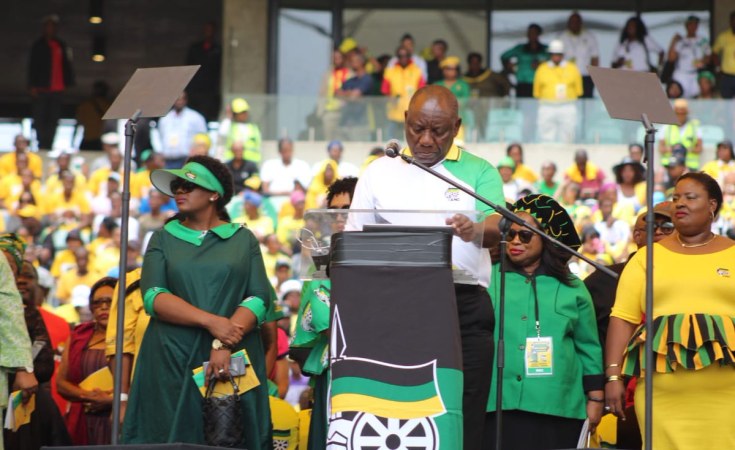As factional fighting dominates South Africa's ruling party, it is the public that pay the cost.
Ever since South Africa's democratic transition in 1994, the African National Congress (ANC) has held sway over the country's political life. As it approaches the end of its third decade in power, however, the party finds itself at a crossroad. Following years of poor governance - marked by policy inconsistency, maladministration, and industrial scale corruption sustained by rent-seeking patronage networks - the ANC's electoral dominance is no longer guaranteed.
As a result, this December's National Elective Conference, which convenes every five years to elect the party's national leadership, could prove a make-or-break moment. Africa's oldest liberation movement is dire need of a course correction. Voter disillusionment on the rise, with some recent polls putting the ANC's national support at less than 50%. In the Local Government Elections in 2021, the ruling party ceded control of key municipalities across South Africa. Opposition coalitions now govern all but three of the country's eight largest metropolitan areas.
Ramaphosa's new dawn fails to materialise
At the ANC's previous elective conference, in 2017, Cyril Ramaphosa and his supporters came out on top on a platform promising renewal and anti-corruption. They defeated the faction supportive of the disastrous administration of Jacob Zuma, who had been president since 2009.
However, little has come of the "new dawn" promised by Ramaphosa since then. His administration can claim some tentative wins regarding reforms to the troubled energy sector and initial state capture prosecutions. But both have been belated and the result of pressure and impending crisis.
The ANC remains beset by internal struggles that frequently spill over into issues of national governance. The blurring between party and state lines continues and, as a result, factional battles within patronage networks in the civil service distract the government at a time of deep economic struggles. With poverty on the rise, the cost of living mounting, and official unemployment over 34%, millions of South Africans are struggling to make ends meet.
To add to Ramaphosa's woes, he will enter the leadership contest - if he contests at all - under the long shadow of corruption issues. The National Parliament is in the process of setting up a committee to deliberate his possible impeachment. This follows revelations around the puzzling circumstances pertaining to the theft of $600,000, hidden in a couch at his game farm, which was not properly reported to authorities. While the timeline of this process is still unclear, it has the potential to derail his re-election campaign.
Waiting in the wings is the Zuma-aligned Radical Economic Transformation (RET) faction, which will be keen to restore its control of the party so it can halt state capture prosecutions and replenish its patronage network. If the previous Zuma presidency is anything to go by, the resurrection of this faction spells disaster at a time the country can afford it least.
South Africa's waning democratic credentials
Internal party squabbles have destabilised the quality of democratic governance in South Africa. Since the inception of the Bertelsmann Transformation Index (BTI) in 2006, for instance, the country's performance has weakened consistently, dropping from the "very good governance" to the "good governance" category, and falling from an "advanced" to "limited" score in its Status Index, a measure of the state of democracy and resilience of the market economy.
South Africa is not the only democracy to see its ratings fall. But unlike in India, Brazil, Poland, or Hungary, where declines are traceable to specific events, this is not the case in South Africa. Rather, its steady decay has been shaped by the party-state conflation over close to three decades. The ANC's stranglehold on public institutions has rendered the state and, by extension, the South African public, vulnerable to party factionalism and individual agendas. Entrenched and sustained by patronage networks that have metastasised across the public sector and key institutions, the ANC's state control has given rise to a governance ethic where high-level officials prioritise party interests above the state. Those who resist are side-lined, or worse; the persecution of whistleblowers and their families is increasingly common.
The prospect of losing power at the national level in 2024 should focus the party's attention on internal reform. However, it remains to be seen if this will happen amid the tug of other interests. The Zuma-aligned faction, for example, is motivated by the survival of the patronage network and redemption from criminal prosecutions. Meanwhile, if the law is allowed to take its course in relation to Ramaphosa's woes, he and his faction may, ironically, find themselves in a similar position. In such a scenario, a compromised winner may emerge either way, potentially damaging the party's prospects beyond 2024.
In the meantime, it will be the South African public that will pick up the tab for the ANC's power games.
Jan Hofmeyr heads the Research and Policy Program of the Institute for Justice and Reconciliation (IJR) in Cape Town, South Africa. Opinions expressed here are his own and not that of the Institute.


